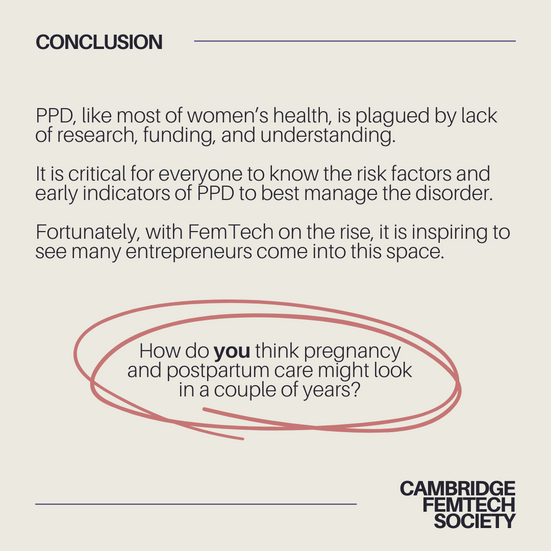Postpartum Depression
- cambridgefemtech
- 16 feb 2024
- Tempo di lettura: 3 min
Contributed article by Maxence-Viktor Liesenborgs.
The baby blues often appear after childbirth for up to two weeks, where one might experience mood swings, crying spells, anxiety, and difficulty sleeping [1]. Compared to the baby blues, postpartum depression (PPD) is more severe and longer-lasting, and can affect the infant and the rest of the family too. PPD is a serious mental disorder and is one of the most common complications related to pregnancy [1]. It is estimated that approximately 20% of postpartum deaths are a result of suicide, highlighting the gravity of this disorder [2].
It has been proposed that PPD prevalence is approximately 10-20%, however, this may be a gross underestimation [2]. Due to differences in socio-economic environments, screening rates and measures, cultural norms, support structures, and stigma, PPD goes largely un/under-diagnosed [2]. As a result, PPD may last for months or even years [1].
While it is unclear how PPD arises, many scientists hypothesise that it is caused by hormonal changes [1]. Throughout pregnancy, oestrogen and progesterone are much higher than usual, and within 24 hours after childbirth, they drop back to normal levels, which may trigger PPD [1]. Other hypotheses include a genetic predisposition or low levels of thyroid hormones [3].
The diagnostic criteria vary around the world but are usually based on the American Psychiatric Association’s Diagnostic and Statistical Manual of Mental Disorders, Fifth Edition (DSM-5), International Statistical Classification of Diseases (ICD-10), or Edinburgh Postnatal Depression Scale (EPDS) [4]. Nonetheless, the usual symptoms that indicate this disorder include low mood, restlessness, agitation, fatigue, isolation, numb feeling, anhedonia, low self-esteem or confidence, weight changes, low libido, hopelessness, hostile or indifferent to your partner or baby, or even suicidal feelings [4,5]. It is advised to reach out for help if any of these symptoms persist for more than 2 weeks or are felt more intensely than usual [6].
There are several factors that may increase susceptibility to PPD [3,6]:
Stress
Diabetes
History of depression
Physical or sexual abuse
Complications during pregnancy
Smoking, alcohol consumption, or drug use
Trouble breastfeeding or caring for your baby
Are under the age of 20
Lack of support structure
Although complete prevention of PPD is not possible, early interference can help lower your susceptibility. Methods of early interference may include cognitive behavioural therapy or interpersonal therapy [1]. However, we recognise that seeking support for any of the above risk factors can be challenging.
If PPD does develop, there are several methods to help manage it and it is best to consult a healthcare professional to create a tailored treatment plan, and make sure it is safe for the baby if the patient is still pregnant or breastfeeding [1]. Less invasive methods include therapy, social support (friends, family, support groups), and self-care. More extreme measures have been antidepressant medication or electroconvulsive therapy, however, these have been inadequate in treating PPD [7]. Other medications now suggested can include brexanolone or zuranolone, which have been found to improve depressive symptoms rapidly [8,9]. Interestingly, there is an active PPD drug (GH001) research study where people who have given birth in the last 12 months can apply to, and it closes on February 29, 2024 [10].
Additionally, several entrepreneurs recognised that we need better care for postpartum mothers and better ways to prevent PPD. Therefore, there are several exciting femtech updates to share. Firstly, Kristen Ellefson and Bindu Chanagala are developing a powerful AI tool to predict postpartum depression, which is backed by the MIT venture accelerator, delta v. “Nutur”, US-based startup, will be a digital health application that enrols high-risk women in care plans to prevent PPD, with the help of OBGYNs [11]. Secondly, Astrid Gyllenkrok Kristensen and Sandra Wirström built LEIA Health, an app that equips soon-to-be mothers with the information they need to know, reinventing postpartum care [12]. While this does not specifically target PPD, it helps create genuine support for postpartum mothers. This fantastic Swedish-based startup raised €600k in angel funding in 2022, and they more recently raised €1.4M in pre-seed funding in 2023 [13]. Lastly, two more digital platforms in the space are Poppy Seed Health, US-based, and Postpartum Plan, UK-based [14,15].
PPD, like most of women’s health, is plagued by lack of research, funding, and understanding. It is critical for everyone to know the risk factors and early indicators of PPD to best manage the disorder. Fortunately, with FemTech on the rise, it is inspiring to see many entrepreneurs come into this space, which makes me wonder how pregnancy and postpartum care might look in a couple of years.
Sources




















Commenti